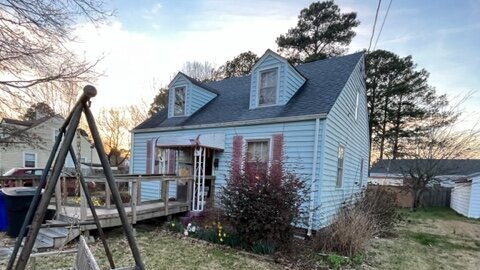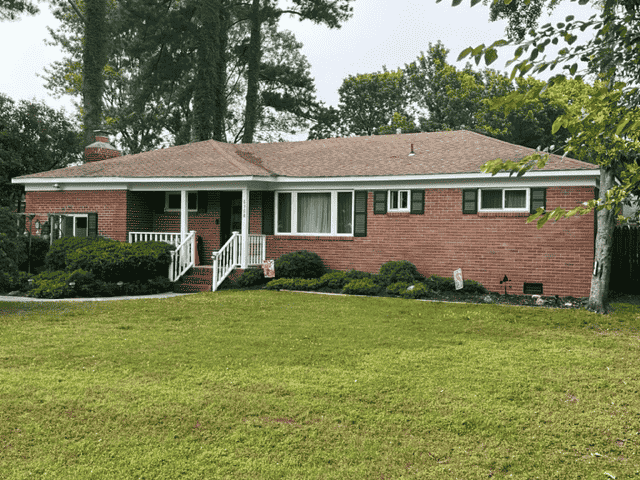
Table of Contents
i) What Happens When You Inherit a Property In Virginia?
a) Legalities Involved When Selling an Inherited House in Virginia
What Is a Probate Process In Virginia?
What Is Transfer on Death Deed (TODD)
Virginia’s Inheritance Law/Succession Law
b) Financial Implications Associated With Selling Your Inherited House In Virginia
Taxes on an Inherited Property in Virginia
1. Inheritance Tax In Virginia (Exempted)
2. Probate Tax at the Time of Filing the Will
3. State Taxes On Inherited Property
Taxes Encountered When Selling an Inherited Property
1. Transfer Tax
2. Property Tax
ii) What Happens When You Inherit a House with a Mortgage in Virginia?
iii) How Can You Sell You Inherited House Fast In Virginia?
a) The Cash Home Buying Solution Provided by Cash Home Buying Companies
b) Benefits of Selling Your Inherited Property For Cash
c) How a Cash Home Buying Solution Can Help You Sidestep Taxes and Other Financial Hurdles?
c) Commissions and Hidden Charges
d) Property Condition and Renovations
v) Conclusion
If you’ve recently found yourself wondering, “how to sell an inherited house in Virginia,” you’re not alone. Many Virginians grapple with the complexities of inherited property—navigating legal mazes, understanding tax implications, and determining the best course of action for their newly acquired property.
In this guide, we’ll break down the process step by step, answering the primary question: How do you sell an inherited house in Virginia? From immediate considerations and actions to consider, right through to tax-saving strategies, we’re here to simplify things.
And as we dive deeper, we’ll explore options that could save you time, money, and stress, including a solution for selling your inherited property that might be just what you need.
What Happens When You Inherit a Property In Virginia?
Inheriting property can be a bittersweet experience. While it might mean gaining a valuable asset, it’s often intertwined with the loss of a loved one, combined with a slew of legal intricacies.
Virginia, like all states, has specific laws and regulations governing inherited properties. Understanding them can significantly simplify the selling process and help you make informed decisions.
Legalities Involved When Selling an Inherited House in Virginia
It’s essential to understand the legal aspects associated with the inheritance process, especially in Virginia. So, let’s delve deeper into the legal intricacies.
What Is a Probate Process In Virginia?
In the realm of inheritance, the word “probate” tends to come up often. Simply put, probate is the legal process that validates and executes a deceased person’s will.
Whether the deceased left a will or not, their real estate typically must pass through the probate process in Virginia. This process ensures that any debts or taxes owed are paid off, and the remaining assets are distributed according to the will—or if there’s no will, according to Virginia’s inheritance laws.
How Long Is The Probate Process?
Generally, the probate process can take between 6 to 12 months, sometimes longer if there are complications or disputes. During this period, the court appoints an executor. If the deceased left a will, they likely specified who this executor would be. If not, the court takes on the responsibility.
The executor’s role is filled with technical responsibilities, which include, but aren’t limited to, settling debts, managing assets, paying necessary taxes, and ensuring heirs receive their rightful inheritances.
Does a will in Virginia have to go through probate as well?
In Virginia, the simple presence of a will doesn’t exempt the estate from the probate process. Every will, regardless of its specifications, must be validated by the court to ensure its legitimacy. Probate serves as this verification platform, confirming that the will is genuine and that it was the final expressed wish of the deceased.
But there’s more nuance here. Not all assets listed in the will require probate. Some assets, like jointly owned properties or those with designated beneficiaries (think life insurance payouts), bypass this system entirely.
It’s essential to understand these intricacies, as they can directly impact your next steps when selling your inherited property.
What Is TODD?
If you’ve inherited a property in Virginia, you might come across the term “Transfer on Death Deed” or TODD.
A TODD is a pre-set arrangement made by the original property owner to ensure that their property passes directly to someone, like you, without getting entangled in lengthy court procedures.
How To Use The Transfer On Death Deed (TODD) And How It Helps You With The Probate Process?
If the property you’ve inherited a property which had a TODD in place, it means you won’t have to wade through the usual probate process, saving you time and potential legal fees. The property will transfer to you more seamlessly.
It’s like the original owner left a clear signpost saying, “This property goes directly to [Your Name]”.
A clearer, faster route to owning the property, fewer legal hoops, and less stress. Always remember, though, it’s good to have a legal expert guide you, ensuring every aspect of the inheritance process goes smoothly for you.
How to Record a Transfer on Death Deed in Virginia
To set up a transfer on death deed in Virginia, fill out the required form and have it acknowledged. Once done, visit the land records section of the circuit court’s clerk’s office where the property is situated. Follow the clerk’s guidance to ensure the deed is officially documented in the land records.
Virginia’s Inheritance Law/Succession Law
Inheritance can sometimes feel like navigating a maze, but Virginia’s laws are relatively straightforward. Here’s a breakdown based on different familial scenarios:
Certainly! Here’s a suggested table format for the data:
| Situation | Inheritance Distribution |
|---|---|
| You die with children but no spouse | Your children inherit everything. |
| Spouse but no descendants | Your spouse inherits everything. |
| Spouse and descendants, all of whom are descendants of that spouse | Your spouse inherits everything. |
| Spouse and descendants, at least one of whom is from someone other than that spouse | Your spouse receives 1/3 of your intestate property, and the descendants inherit the rest. |
| Parents but no spouse or descendants | Your parents inherit everything. |
| Siblings but no spouse or parents | Your siblings inherit everything. |

Financial Implications Associated With Selling Your Inherited House In Virginia
Transitioning from understanding the legal landscape of inheriting property in Virginia, it’s equally crucial to grasp the financial implications that come with selling such an asset.
The sale process doesn’t just involve listing and finding a buyer; there are several financial nuances specific to Virginia you should be aware of.
Taxes on an Inherited Property in Virginia
Upon inheriting a property, one might assume immediate tax implications. However, in Virginia, it’s the sale, not the inheritance, that predominantly triggers taxes.
1. Inheritance Tax In Virginia (Exempted)
In Virginia, when you inherit a property, you aren’t burdened by the state with an inheritance tax. And if you’re the spouse or child of the deceased owner, you’re in the clear—Virginia’s inheritance tax exemptions extend to you.
2. Probate Tax at the Time of Filing the Will
Upon filing the will, a probate tax is imposed. Typically, this equates to $1.00 for state probate tax, plus an additional local tax of .33¢ (if applicable) for every $1,000.00 value of the estate.
3. State Taxes On Inherited Property
Final Income Tax Return: It’s essential to ensure the final income tax return of the deceased is filed.
Final Personal Property Tax Return: Similarly, the deceased’s final personal property tax return must be addressed.
Estate’s Income Tax Return: If the estate accumulates significant income post the owner’s demise, it necessitates filing an income tax return.
Virginia Estate Tax Return: This return is typically required if a federal estate tax return is necessary. It’s important to note that generally, the need arises only if the estate’s gross value exceeds the threshold set by state and federal statutes.
4. Federal Taxes
Much like the state obligations, federal requirements also encompass the decedent’s final income tax, the estate’s income tax, and, if applicable, the estate tax return. This emphasizes the fact that while Virginia might have specific tax obligations, the overarching federal obligations mirror state requirements.
Generally, estate taxes – spanning both federal and state – apply predominantly when the gross estate (which may encompass life insurance and survivorship property not managed by a fiduciary) surpasses the threshold defined by federal and state laws.
Taxes Encountered When Selling an Inherited Property
1. Transfer Tax
Upon transferring the property’s ownership, you’re met with the transfer tax. In Virginia, this fee is levied at $2.50 per every $1000 of your home’s sale value. However, bear in mind that certain counties might have slight variations in this rate.
2. Property Tax
Virginia’s property tax, with its average effective rate of 0.75%, stands below the national mean of 0.99%.
3. Capital Gains Tax
The capital gains tax isn’t imposed upon inheriting the property but comes into play when you decide to sell. It’s based on a ‘stepped-up basis’, courtesy of the IRS. Virginia’s standard rate for this tax stands at 5.75%.
What Is Stepped Up Basis and How Can I save On Capital Gain Taxes In Virginia While Selling my Inherited House?
A key provision in federal tax law known as the “Step-Up in Basis” can significantly reduce your capital gains tax liability when selling an inherited property. Let’s delve into how this works and the benefits it offers.
Understanding the “Step-Up in Basis”
The “basis” of an asset typically refers to its original purchase value. But, when an asset like real estate is inherited, the basis can be adjusted or “stepped-up” to its value at the time of the original owner’s death, rather than its initial purchase price.
A Practical Example
Imagine a homeowner acquired a property in 1990 for $150,000. When the owner passed away in 2020, the home’s market value had risen to $350,000. Due to the step-up provision, the inherited house’s new basis for the heirs is this elevated value of $350,000, not the $150,000 purchase cost.
Now, let’s say the heirs sell the home in 2023 for $500,000. With the stepped-up basis in place, their taxable capital gain is $150,000 (selling price of $500,000 minus the stepped-up basis of $350,000). Given Virginia’s capital gains tax rate of 5.75%, the tax on this gain would be $8,625.
However, without the step-up in basis, the picture looks different. If the original $150,000 purchase price was used, the taxable gain would be $350,000 (sale price of $500,000 minus the original basis of $150,000). At 5.75%, the heirs would owe a whopping $20,125 in capital gains tax—a substantial difference!
The Implications
Without this step-up provision, inheritors could face a much steeper tax bill. They would have been taxed on the total gain from the home’s original purchase price, leading to heftier capital gains tax liabilities.

What Happens When You Inherit a House with a Mortgage in Virginia?
After understanding the financial landscape surrounding the sale of an inherited property in Virginia, there’s another essential aspect that demands attention – inheriting a property that still has an outstanding mortgage. This situation presents a unique set of challenges and options, which is not uncommon, given the long tenure of home loans.
When you inherit a house with a mortgage in Virginia, you might feel a surge of questions. Will the lender require an immediate payoff? Can you assume the existing loan? What if you can’t make payments? Here’s what you should know
Let’s examine some situations you might find yourself in with your inherited property:
| Scenario 1: Selling to Offset the Mortgage |
| Situation: Imagine your Aunt passes away, leaving you her charming Virginia cottage. However, there’s a catch – there’s still $100,000 left on the mortgage. Given your current financial situation, managing this inherited debt doesn’t seem feasible. |
| Solution: Selling the cottage might be your best move. Suppose the property market value is $300,000. By selling, you’d not only cover the $100,000 mortgage but also walk away with a substantial profit, which, after other potential costs, could be split among any other beneficiaries. |
| Scenario 2: Assuming the Mortgage Of The Deceased Person |
| Situation: Your father leaves you the family home, a place steeped in memories. While selling seems like an easy way out, especially with a $75,000 mortgage hanging over it, you’re emotionally attached and wish to keep it. |
| Solution: Transferring the mortgage to your name could be the path forward. With your stable income, you assess and realize that you can manage the monthly payments. After a discussion with the lender and going through necessary paperwork, the home and its memories remain with you, along with its monthly payment responsibilities. |
| Scenario 3: Facing Foreclosure (You Don’t Want This) |
| Situation: Your distant cousin bequeaths you a house. On further inquiry, you discover an outstanding mortgage of $150,000. Neither you nor any other heirs are in a position to settle this amount, and the property isn’t in a state that guarantees a high sale value. |
| Solution: Foreclosure seems inevitable. While not the most pleasant outcome, it’s essential to understand that this process isn’t a reflection of your financial prudence. If no heir steps up, and selling is not viable, the lender will reclaim the property. It might be best to consult with a local attorney to ensure minimal complications and to explore any potential alternatives. |

How Can You Sell You Inherited House Fast In Virginia?
Inheriting a house, while being a substantial asset, also comes with its own set of challenges, you don’t want it be sold as a foreclosed property or as a tax lien property by the state, if taxes are not paid.
From understanding intricate inheritance laws to the financial implications tied to the property, the process can become a tad overwhelming. But what if there’s a silver lining? A faster, more efficient way to liquidate this asset without the typical hassles?
The Cash Home Buying Solution Provided by Cash Home Buying Companies
The real estate market is always evolving, offering property owners an array of solutions to fit their unique situations. One of the emerging and rapidly growing trends in Virginia is the cash home buying solution. It’s a direct approach that cuts out many of the middlemen, making property transactions smoother and quicker.
What is the cash home buying process?
The cash home buying process is pretty straightforward. Here’s a breakdown:
Reach Out to a Professional Cash Home Buying Company: Begin by contacting a reputable cash home buyer in Virginia. They usually offer a no-obligation consultation.
Property Evaluation: After initial discussions, the cash buyer evaluates your property, considering its damages, condition and other factors that might influence its value.
Receive an Offer: Once the evaluation is done, you’ll receive a cash offer. This offer is often fair market value, including repairs or updates the property might need. You don’t need to repair the damages that you have in your property.
Accept and Close: If the offer aligns with your expectations, you can accept it. The cash home buying company then arranges the paperwork, and the deal can close in quickly, depending on specific circumstances. Saving you from all the lengthy paperwork and bureaucratic procedures.
Benefits of Selling Your Inherited Property For Cash
Selling an inherited house through traditional means can often be a lengthy, complicated process. Comparatively, the cash home buying method offers several distinct advantages:
Immediate Liquidation: One of the primary benefits is the speed of the transaction. You can convert your property into cash within a week or so, which can be crucial if there are any pressing financial demands.
Avoiding Lengthy Market Listings: The conventional route involves listing your property on the market, waiting for a potential buyer, hosting open house visits, and haggling over price. The cash option bypasses all this.
| One of my client, inherited his parents home. However, the financial implications of maintaining it became burdensome. Realizing that a traditional sale might take months, and that time was a luxury he didn’t have, he turned to a HR Property Doctor- Cash Home Buying Solutions. The swift transaction not only saved him from potential foreclosure but also from substantial closing costs and property taxes. |
Bypassing Costly Home Renovations: Traditional selling often requires homeowners to invest in repairs or upgrades to make the property appealing. With cash home buyers, they buy “as-is”, meaning you don’t have to pour more money into the house before selling.
How a Cash Home Buying Solution Can Help You Sidestep Taxes and Other Financial Hurdles?
Selling your inherited house in Virginia for cash can also help mitigate some of the financial complications. By selling quickly, you potentially sidestep prolonged property taxes.
One of our clients, in fact recently, inherited her childhood home after her parents passed. The house, due to its age and lack of upkeep, needed maintenance and upgradation and was delinquent property.
The looming property taxes and repair costs seemed insurmountable. Just when selling seemed impossible, she stumbled upon the cash home buying solution. Within ten days, she sold her house to us, settled her dues, and even had enough to invest in a small apartment for herself.

Real Estate Agents vs. Professional Cash Home Buyers: Who You Should Choose To Sell Your Inherited House In Virginia
While both real estate agents and professional cash home buyers operate within the housing market, their approaches, advantages, and service scopes differ markedly. Let’s delve into a comparative look at both to help you make an informed decision for your inherited property in Virginia.
a) Closing Costs
- Real Estate Agents: When selling through an agent, you’ll likely bear some closing costs, which can be a significant percentage of the sale price. These costs include fees for escrow, title searches, and more.
- Professional Cash Home Buyers: One of the primary benefits of cash home buyers is the absence of traditional closing costs. This means when you get an offer, what you see is what you get.
b) Communication and Guidance
- Real Estate Agents: Agents will usually communicate about potential buyers, pricing, and listing strategies. However, they might not be equipped to guide you through complex processes like probate.
- Professional Cash Home Buyers: These buyers often have extensive knowledge about real estate, inherited properties and the accompanying legal intricacies. They will communicate and potentially guide you during the probate process, ensuring you’re not navigating the complexities alone.
c) Commissions and Hidden Charges
- Real Estate Agents: Selling through an agent means paying a commission, typically around 5-6% of the sale price. There might also be other hidden fees associated with the sale.
- Professional Cash Home Buyers: With cash buyers, there are no commissions. Additionally, transparency is a hallmark of their service, meaning you shouldn’t encounter unexpected fees or charges.
d) Property Condition and Renovations
- Real Estate Agents: To get the best price, agents often suggest renovations or repairs before listing. This means upfront costs and time delays.
- Professional Cash Home Buyers: These buyers purchase properties “as-is.” This means you won’t need to invest in repairs or wait for renovations before selling.
e) Speed of Sale
- Real Estate Agents: The traditional market can be unpredictable. Sometimes houses sell quickly, but it’s also common for properties to remain on the market for months.
- Professional Cash Home Buyers: Speed is one of the defining features of cash buyers. Offers are often made within a few days, and sales can close within a week or so, making this option particularly beneficial for those looking to liquidate quickly.
Conclusion
Navigating the maze of inheritance, property sale, and the intertwined tax implications can seem daunting. However, armed with the right knowledge and with the guidance of experts, the process can become far more manageable and beneficial.
At HR Property Doctor, we pride ourselves on being those experts—your go-to Professional Cash Home Buyers. Our mission is not just about purchasing your inherited property; it’s about ensuring you walk away with a cash offer that truly represents the value and potential of your asset. We take the time to understand all the intricacies, both legal and financial, so that you don’t have to. Our promise to you is a seamless transaction and an offer that optimizes your financial gains.
Whether you are confused about how to sell inherited house in Virginia Beach, Chesapeake, Franklin, Hampton, Newport News, Norfolk, Petersburg, Portsmouth, Suffolk, Williamsburg, or Yorktown, VA, on cash. HR Property Doctor is here to guide you and provide you with cash offer for your inherited house. Let us help you navigate and achieve superior cash equity for your house in Virginia.
Thank you for joining us on this insightful journey. Remember, with the right partner by your side, even the most complex challenges can turn into rewarding opportunities.
Frequently Asked Question- FAQs
1. Does a Transfer on Death Deed (TODD) Bypass the Probate Process in Virginia?
The answer is, unequivocally, yes. Using a TODD can simplify the property transfer process. By design, a TODD allows a property owner to designate a beneficiary who will inherit the property directly upon the owner’s death, thus circumventing the often cumbersome probate process.
2. How to avoid paying capital gains tax on inherited property near Virginia?
To minimize or avoid capital gains tax on inherited property in Virginia, beneficiaries can leverage the “step-up in basis” provision. This adjusts the asset’s basis from its value at the original purchase time to its value at the time of the owner’s death. By selling the property close to its stepped-up basis value, you can reduce or even eliminate capital gains.
3. How do I avoid probate in Virginia for real estate?
To avoid probate for real estate in Virginia, property owners can utilize tools like living trusts, joint ownership, and Transfer on Death Deeds (TODD). Placing your property in a living trust or holding it in joint tenancy with the right of survivorship can bypass the probate process upon your death.
4. Are there any specific requirements for a TOD deed to be valid in Virginia?
Yes, if the real property is co-owned, all owners must sign the TOD deed for it to be valid. Additionally, all property owners must have the legal capacity to sign the deed, meaning they should not have conditions like dementia, Alzheimer’s, or any other issues that prevent them from legally executing documents.
5. Can a TOD deed be revoked in Virginia?
Yes, a TOD deed is revocable. Even after recording a TOD deed at the local Clerk of Court’s office, the property owner(s) can file another deed to revoke the TOD deed. The owner retains the full power to sell the property in the future without requiring the consent or signature of the named beneficiary on the TOD deed.

